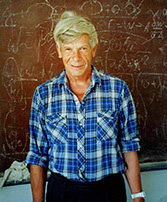Speaker
Description
The current status of experimental tests of quantum electrodynamics with heavy ions is briefly reviewed. Special attention is focused on tests of QED in
supercritical regime. According to the standard QED theory, in slow collisions of two bare nuclei with the total charge number larger than the critical value, Z_1+Z_2 > Z_c =173, the initially neutral vacuum can spontaneously decay into the charged vacuum and two positrons. Detection of the spontaneous positron emission would be the direct evidence of this fundamental phenomenon. However, the
spontaneous positron emission is generally masked by the dynamical positron
emission, which is induced by a strong time-dependent electric field created
by the colliding nuclei. For many years it was believed that the vacuum
decay can be observed only in collisions with nuclear sticking, when the
nuclei are bound for some period of time due to nuclear forces. In our recent papers [1,2], it was shown that the vacuum decay can be observed without any sticking of the nuclei. This can be done via measurements of the pair-production probabilities or the positron spectra for a given set of nuclear trajectories. The results of this study will be presented in the talk.
References
[1] I.A. Maltsev, V.M. Shabaev, R.V. Popov, Y.S. Kozhedub, G. Plunien,
X. Ma, and Th. Stöhlker, and D.A. Tumakov, Phys. Rev. Lett. (2019), 123 ,
113401.
[2] R.V. Popov, V.M. Shabaev, D.A. Telnov, I.I. Tupitsyn, I.A. Maltsev,
Y.S. Kozhedub, A.I. Bondarev, N.V. Kozin, X. Ma, G. Plunien, Th. Stöhlker,
D.A. Tumakov, and V.A. Zaytsev, Phys. Rev. D (2020), 102, 076005.

